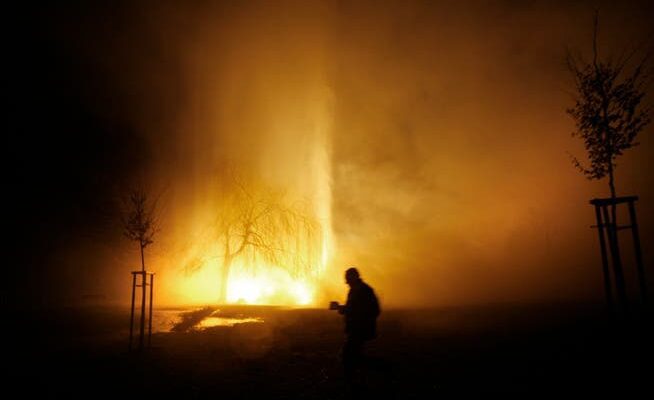After the firecrackers at the turn of the year, the issue gained momentum.
A burden for domestic and wild animals: around New Year’s Eve, more fireworks are set off year after year, and a good part of them produce noise instead of colorful magic lights.
The Hotel Radisson Blu at Zurich Airport has become a refuge for a particularly noise-sensitive clientele over New Year’s Eve. Because it has soundproof windows. Around a hundred dog owners have taken up quarters there with their animals in order to spare them the psychological torture of firecrackers and loudly cracking rockets.
One of them was Roman Huber, one of the minds behind one Initiative for a nationwide ban on noisy fireworksthe one Report in the Tamedia newspapers confirmed on request. Like many others, he booked the hotel well in advance – it’s one of many tips circulating on the Internet for getting through the new year with dogs without stress. In the lobby of the “Radisson” there was a coming and going of fellow sufferers with their four-legged friends.
10,000 signature sheets in three days
Huber’s goal is that such actions will no longer be necessary in the future. The initiative just got a double boost. On the one hand, one of Zurich’s most popular institutions has publicly backed it: the zoo, which otherwise rarely takes a stand on political issues. On the other hand, according to Huber, the signature form for the initiative has been downloaded around 10,000 times in the past three days. The collection runs until November, almost 60,000 votes are missing.
The fact that Zurich Zoo, together with dozens of animal and environmental protection organizations, is committed to the initiative is not primarily due to concern for the animals kept there. The pyrotechnical explosions are also stressful for them, says zoo director Severin Dressen to the Tamedia newspapers, but they are used to the noise and hustle and bustle. Wild animals, on the other hand, frightened by the noise, could even die as a result of the stress.
This is also how the initiative argues. She demands that fireworks that “make noise” be banned throughout Switzerland. According to Huber, this means those who “bang”. However, this could not be properly translated into the other national languages. The cantonal authorities should be allowed to make exceptions for events of national importance, such as the big New Year’s Eve fireworks display over Lake Zurich. In the city parliament, the left-green majority recently wanted to ban the big fireworks at the Züri-Fäscht for ecological reasons and received a lot of criticism for this.
The initiative, on the other hand, is aimed at private banging, which often takes place on hillsides in the city of Zurich, near the edges of the forest. According to the Federal Office for the Environment, the use of firecrackers and fireworks around the turn of the year has increased in recent years. This is not only a burden for the animal world, which suffers from the noise, but also for soil, water and human lungs: the 400 tons of pyrotechnics that are fired in Switzerland every year cause around 2 percent of the total fine dust pollution.
At a measuring station in downtown Zurich, the value on New Year’s Eve soared to more than five times what is usual on the busy Rosengartenstrasse. The fact that there are other reasons for a firecracker ban is shown in Berlin, where such a firework ban is currently being discussed after violent attacks on rescue workers and police officers.
A fireworks ban initiative could gain considerable support from animal and nature conservation groups alone: almost 69,000 dogs were recently registered in the canton of Zurich, which corresponds to around 56,000 owners who in turn have friends and family. There are also large organizations such as Pro Natura, which reaches around 30,000 people in the canton of Zurich, or the Zurich Animal Welfare Organization with over 11,000 supporters. And now the zoo too.
